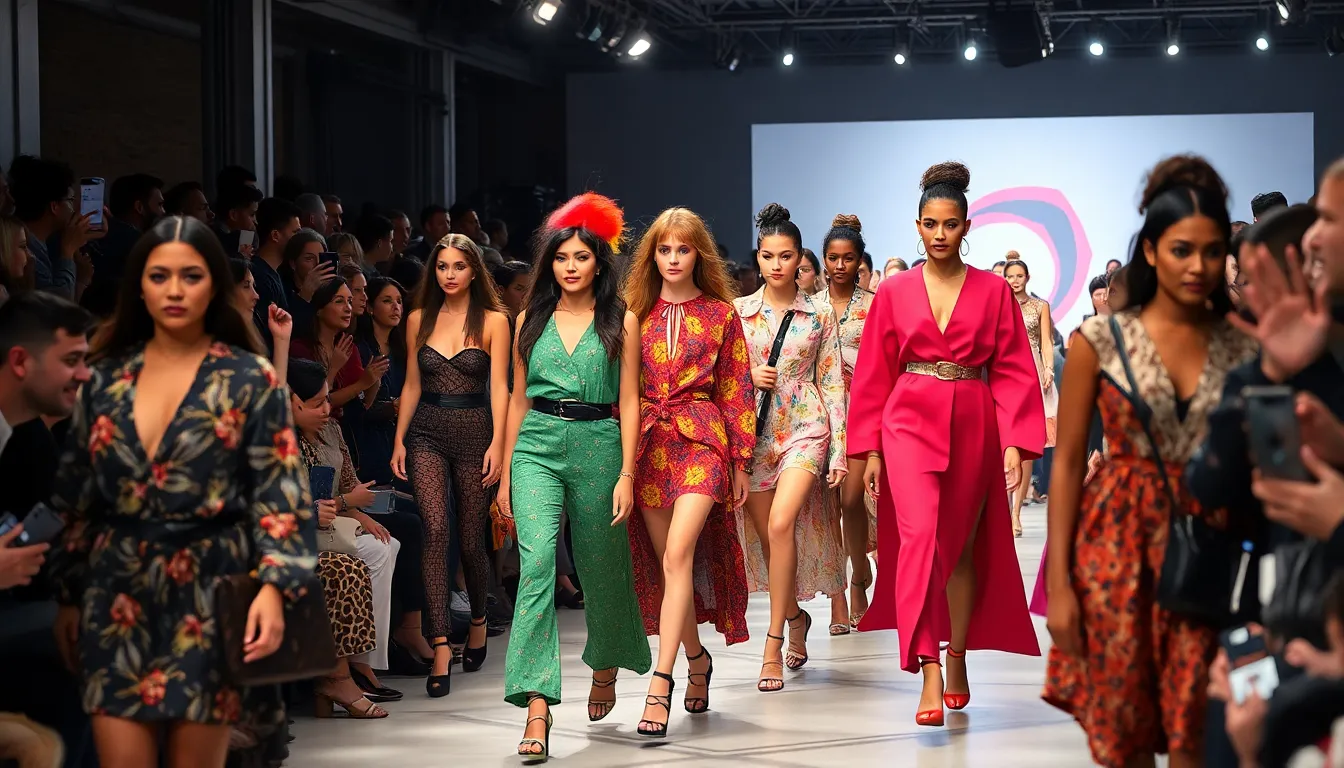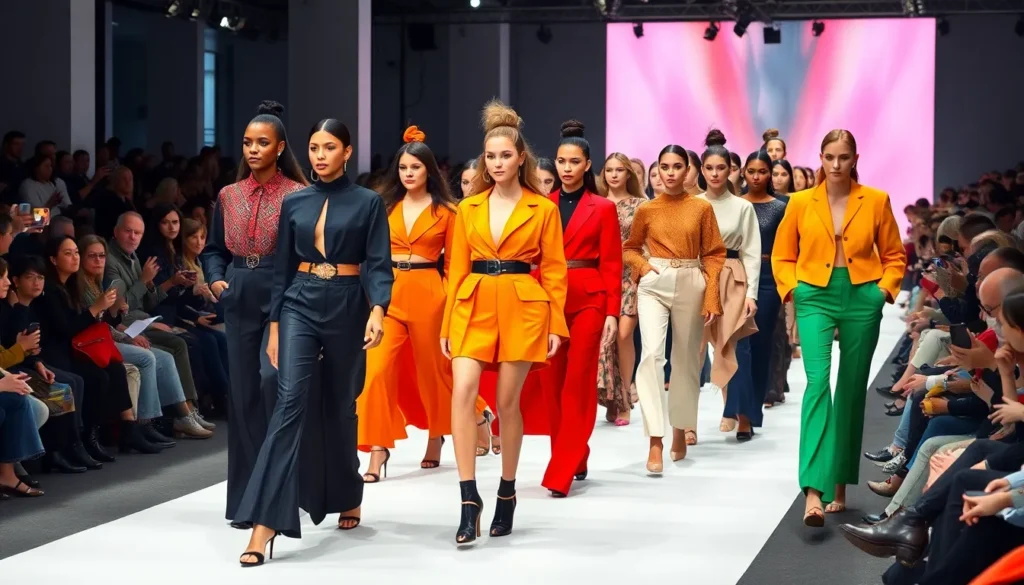Fashion Week isn’t just an event; it’s a global phenomenon that sets the tone for trends and styles each season. Designers, models, and fashion enthusiasts gather in iconic cities like New York, Paris, Milan, and London to showcase their creativity and innovation. This whirlwind of glamour and artistry captivates audiences and influences wardrobes worldwide.
As the lights dim and the first model steps onto the runway, anticipation fills the air. Each collection tells a story, reflecting cultural shifts and societal changes. From haute couture to ready-to-wear, Fashion Week highlights the ever-evolving landscape of fashion, making it a must-watch for anyone passionate about style. Whether you’re a trendsetter or simply curious about the latest looks, the excitement of Fashion Week is hard to resist.
Table of Contents
ToggleOverview of Fashion Week
Fashion Week represents a critical event in the fashion industry, serving as a platform for showcasing seasonal collections. Designers from various backgrounds gather in iconic cities—New York, Paris, Milan, and London—to present their innovative ideas. Models walk runways, highlighting the creativity and craftsmanship behind each piece.
Fashion Week not only influences trends but also reflects societal shifts, allowing designers to tell stories through their collections. Each show signifies a dialogue between fashion and culture, aiming to resonate with audiences worldwide. Attendees range from industry professionals to fashion enthusiasts, making it a significant occasion for networking and inspiration.
The structured schedule features various designers, with notable shows often generating buzz across social media platforms. Live coverage and streaming provide broader accessibility, connecting audiences to the latest in fashion. Through Fashion Week, the industry can emphasize its importance in shaping future trends and styles.
History of Fashion Week

Fashion Week has transformed significantly since its inception, evolving into a pivotal event in the fashion industry. The event showcases innovative designs while reflecting changes in cultural and societal trends.
Evolution Over the Years
Fashion Week began in 1943 as “Press Week” in New York City, aiming to promote American designers during World War II. This marked the first organized display of collections, highlighting local talents. The concept quickly spread globally, with Paris launching its first official Fashion Week in 1973. Over the decades, it expanded to include major fashion capitals, such as Milan and London. By the 21st century, Fashion Week adopted digital formats, allowing broader access to audiences worldwide through live streams and social media. Technological advancements continue to reshape the event, enhancing its reach and engagement.
Key Milestones
| Year | Milestone |
|---|---|
| 1943 | Initiation of Press Week in New York |
| 1973 | First Paris Fashion Week |
| 1984 | Launch of Milan Fashion Week |
| 1993 | Introduction of London Fashion Week |
| 2000s | Rise of digital coverage and streaming |
| 2020 | Adaptation to virtual shows during COVID-19 |
Significant milestones illustrate the growth of Fashion Week, showcasing the industry’s response to market demands and cultural shifts. Each event builds anticipation through unique themes and storytelling, reinforcing its status as a cornerstone of the fashion calendar.
Major Fashion Weeks Around the World
Fashion Weeks occur globally, showcasing designers and influencing trends across the fashion industry. Here are the prominent Fashion Weeks that shape the style landscape.
New York Fashion Week
New York Fashion Week (NYFW) takes place biannually in February and September. It features over 100 designers, including established names like Michael Kors and emerging talents. NYFW emphasizes ready-to-wear collections, attracting buyers, celebrities, and influencers. The event takes place in venues throughout Manhattan, making it a vibrant hub for fashion. Recent seasons showcased themes addressing sustainability and cultural diversity, reflecting broader societal changes.
Paris Fashion Week
Paris Fashion Week ranks as the pinnacle of global fashion events, held twice a year in March and September. Known for haute couture, it showcases luxurious collections from designers like Chanel, Dior, and Givenchy. Paris Fashion Week serves as a trendsetter, influencing styles worldwide. The event unfolds in iconic locations such as the Eiffel Tower and the Louvre, providing a stunning backdrop. Recent collections spotlighted innovative techniques and more inclusivity in design, resonating with contemporary audiences.
Milan Fashion Week
Milan Fashion Week occurs in February and September, renowned for its bold designs and craftsmanship. It features prominent designers like Gucci, Versace, and Prada, emphasizing ready-to-wear collections. Milan’s rich style heritage enriches the atmosphere, attracting fashion enthusiasts and industry professionals. The event integrates innovative technologies, such as virtual presentations and digital marketing, enhancing global accessibility. Recent seasons focused on themes of nostalgia and environmental consciousness, engaging a diverse audience.
London Fashion Week
London Fashion Week, held in February and September, is known for its creativity and avant-garde designers. It showcases talents like Vivienne Westwood and Burberry, emphasizing both established and new voices in fashion. This Fashion Week embraces diversity and promotes sustainability among designers. The event takes place in various central locations, creating an inclusive atmosphere for attendees. Recent themes explored cultural storytelling and streetwear influences, reflecting London’s dynamic fashion culture.
Trends and Highlights
Fashion Week consistently showcases emerging trends and significant highlights from the season, offering a glimpse into the future of fashion.
Notable Designers and Collections
Designers unveil innovative collections that captivate audiences each season. This year, notable participants include:
- Alexander McQueen: Known for its dramatic runway presentations, this brand emphasized sustainability through its eco-friendly materials while exploring the theme of nature’s resilience.
- Prada: The collection spotlighted bold colors and intricate patterns, delving into the duality of femininity and masculinity, enhancing its renowned reputation for challenging traditional norms.
- Balenciaga: Signature oversized silhouettes and deconstructed styles emerged, drawing attention to urban aesthetics and social commentary within the fashion industry.
Influential Moments
Fashion Week is rife with moments that redefine industry standards. Particularly, the following instances stood out:
- Cultural Collaborations: Designers collaborated with artists and influencers from diverse backgrounds, highlighting global perspectives and fostering inclusivity.
- Virtual Showcases: New formats emerged as virtual showcases offered wider accessibility, allowing global audiences to experience collections in real-time without geographical limitations.
- Diverse Runways: Increased representation of models of various ethnicities and body types marked a shift towards inclusivity, setting new benchmarks for diversity across the board.
These trends and highlights reinforce the significance of Fashion Week as a launching pad for future innovations and cultural conversations in the fashion industry.
Fashion Week continues to be a pivotal event that shapes the future of style and trends across the globe. Its rich history and evolution reflect a dynamic industry that adapts to cultural shifts and technological advancements. Each season brings fresh narratives and innovative designs that resonate with audiences worldwide.
The event not only showcases the creativity of established designers but also provides a platform for emerging talent. As Fashion Week evolves, it remains an essential part of the fashion calendar, influencing not just what people wear but also how they perceive and engage with fashion. The excitement and anticipation surrounding each show highlight the event’s enduring significance in the ever-changing landscape of style.




